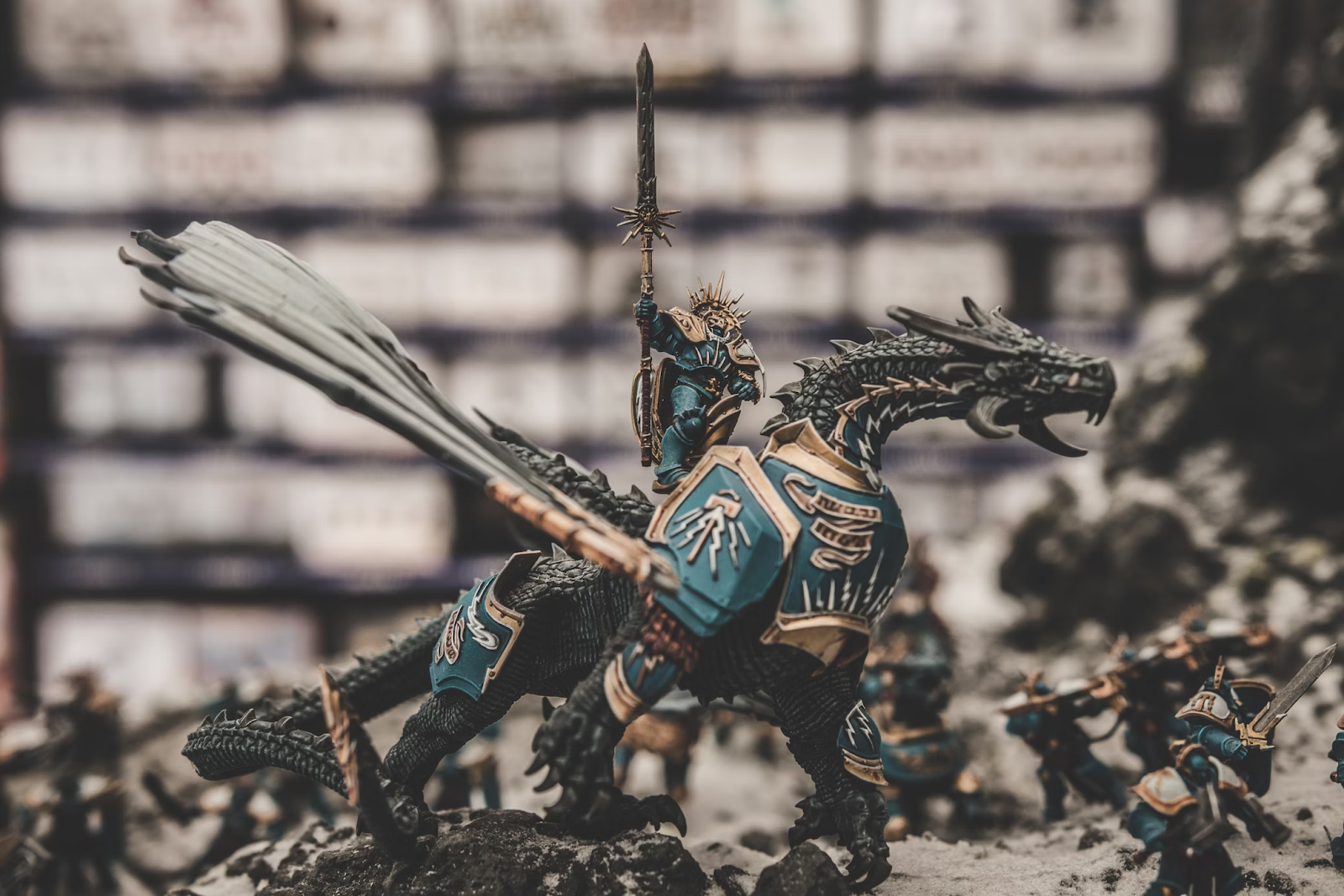Fantasy is an interesting topic.
For many people, when you say fantasy you are talking about a sword-wielding hero with a magic sword who battles dragons and rescues princesses in a fictional, medieval kingdom. And they wouldn't be wrong for thinking that. The basis of fantasy is a fantastic story in a fantastic setting with fantastic situations. So this very broad idea of fantasy certainly fits the mold.
However, all I have to do is ask you if The Hobbit is the same thing as Conan the Barbarian, or King Arthur. The plain answer is no, they are not the same thing, Not by a long shot. Although they can be called fantasy, these are very different stories.
We refer to these different types of fantasy as sub-genres when something does not neatly fit within a genre label, and yet still technically qualifies. There are an endless number of sub-genres within fantasy, but what I would like to do is look at what I consider to be the big five sub-genres and how I like to think about them.
High (Epic) Fantasy, Sword and Sorcery, Grimdark, Fairytale and Fae.
And I think the best way to think about this is to think of them like movie genres.
High Fantasy = Drama/epics
Sword and sorcery = Action/adventure
Grimdark = Psychological thriller/horror
Fairytale = family friendly/Comedy (unless the writer is obsessed with sex)
Fae (fairy without the tale) = Chick flick
Let's break these down.
High Fantasy is the most like a movie drama. It involves a slow pace where the character undergoes a significant transformation. The stakes are usually global, typically the story centers on a large cast of characters to support the protagonist. Multiple races are present, such as elves and dwarves, and the use of magic is considered normal and natural. This sub-genre typically builds off the hero's journey and takes its time, spread out over a massive series. Complex world-building is a staple. Examples include The Lord of the Rings, The Wheel of Time, Eragon, and The Elder Scrolls.
Sword and Sorcery is more like an action-adventure movie. These stories are typically fast-paced with lots of swashbuckling, and the stakes are generally personal rather than global. Usually, the focus is on a single protagonist, or else a band of three or four. Typically, there are only human beings. No elves or dwarves (although there are exceptions). The heroes are often more like antiheroes, as they can be thieves and criminals who perform heroic deeds. Magic is strange and unnatural, and only villains or crazy people have anything to do with it. There tend to be elements of horror. Worldbuilding is an element, but usually is not complex and only tells you what you need to know. Examples include Conan the Barbarian, Fafhrd and the Gray Mouser, Elric of Melnibone, and to some extent, The Pirates of the Caribbean.
Girmdark is most like a scary movie. It has many similarities to high fantasy, as far as the stakes and the characters go, but there is a sense of despair that runs through the story. Often, these stories are brutal, gory, and highly political. There is an ominous threat looming in the distance and no one is safe, neither now nor then. Some refer to Grimdark as Dark Fantasy, in which the goal is to frighten the reader. I tend to blend the two of them, because I see both thriller and horror elements present, and the stories are always bleak. Not to put too fine a point on it, but these stories are grim and dark. Examples include Game of Thrones (which features a hoard of undead and weather disaster, so horror) and Warhammer 40,000.
Fairytale is more light-hearted and family-friendly. Many modern fairytales are hybrids of high fantasy and sword and sorcery. These are highly fanciful stories that feature lovable characters who are noble and kind. Often, fairytales are based on some kind of folklore. Political issues and logic don't usually hold much value in a fairytale setting, which is why a prince can marry a peasant, and no one bats an eye at it. Fairytales tend to be rather fluid. Animals are often sentient (think Alice in Wonderland), dwarves, elves, and gnomes are usually synonymous, and magic is as natural as the wind. Examples include Snow White and the Seven Dwarves, The Wizard of Oz, and to some degree, The Legend of Zelda.
Fae is a more modern subgenre. In fact, I would say it is emerging. Still, Fae is a high fantasy story wrapped around a romance plot featuring faeries (fairy?). Fae is very feminine in tone. These stories feature strong female protagonists who happen to be fae (fairy). Instead of the traditional depiction of faeries (fairies?) in the vein of Tinkerbell, these fae are tall, beautiful, and endowed with powers that include shape-shifting, control of the elements, ect. These are very much the chick flicks of the fantasy genre, which is a bit of a breath of fresh air considering the masculine history of the genre. Examples include A Court of Thrones and Roses, Half Sick of Shadows, and Carnival Row.
Obviously, this is a very basic understanding of these sub-genres, and there are countless more. There are even sub-genres of sub-genres! Sword and Sorcery includes sword and sandal and sword and planet, for instance.
Urban Fantasy
Gaslamp Fantasy
Historical Fantasy
Sci-Fi Fantasy
It goes on and on. And the Sub-Genres even have overlap. Sword and Sorcery can also be Grimdark. You can have High Fantasy fairy tales. The truth is, there are no hard rules, because if it is fantasy, then it is fantasy.
Still, I think you can best understand these sub-genres by associating them with movie genres. My personal favorite is Sword and Sorcery. It was once high fantasy, but the appeal wore off for me when I realized I was a third of the way through a doorstopper book and I had read a comprehensive history of the world, yet I had not left the first scene of the story. I felt that my time was being wasted, or that I had fallen out of love with fantasy.
Later, I would start reading Sword and Sorcery. That made me realize that I still love fantasy and that my tastes had merely changed. Fast-paced, brisk books with an emphasis on action. Characters that were flawed, villains that were truly evil, monsters that frighten, and ancient worlds filled with mystery and wonder. I was hooked.
Sword and Sorcery is usually considered short fiction, although there are exceptions. Short stories, novellas, and short novels are common. Stories are episodic, mostly. Meaning they are self-contained adventures and don't usually connect to a larger plot. For instance, in the Conan story "The Tower of the Elephant", Conan teams up with a thief to steal a magic jewel from a sorcerer. He fights giant spiders and even encounters things from other planets. It paints the picture of a much larger world, but the story comes to an end, and we pick up in the next story with Conan being an old man and a king. In the next one, he is a pirate. Then he is recruited to lead an army against a supernatural tyrant.
With Sword and Sorcery, you end up with a collection of campfire tales that center on a wandering swordsman who finds ancient ruins or gets involved with local politics. He eventually finds himself involved in a conflict with a supernatural monster, sorcerer, or the local government and inevitably gets out of trouble by his own might or wit. Lovecraftian horror is a staple here, as the hero needs to feel a real sense of dread at the magic he witnesses (because magic is rare and dangerous, and only evil or crazy people practice it).
I recently summed up the spirit of sword and sorcery by referring to it as a blend between Yojimbo, Indiana Jones, and Lovecraft. I think that is an apt description.
What is your favorite fantasy sub-genre? What is keeping you from writing it?


Comments
Post a Comment